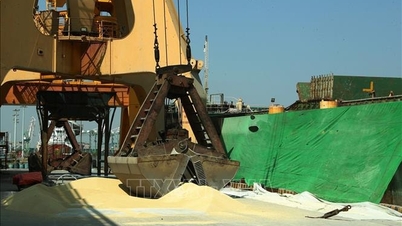China surpasses 5,000 AI companies
Over the past five years, the number of AI companies in China has grown from more than 1,400 to more than 5,000. This growth was announced at the World Intelligent Industry Expo 2025 currently taking place in the city of Chongqing.
China has built more than 40,000 smart factories, 11 national pilot zones for AI innovation, and 17 national demonstration zones for intelligent connected vehicle testing. This is an important foundation for promoting the application of AI in manufacturing and transportation.

A humanoid robot interacts with visitors at the 2025 World Intelligent Industry Expo in China. (Source: Xinhua)
The Chinese government has set up a 60 billion yuan (about $8.4 billion) AI industry investment fund and issued more than 240 core technical standards for AI. AI ethics codes and an AI cooperation center with BRICS have also been launched.
China has been planning to develop a new generation of AI since 2017. Recently, the country has continued to promote the “AI Plus” initiative to build a smart economy and a cooperative society between humans and machines.
According to Mr. Wan Gang, President of the China Association for Science and Technology, the strong development of the country's AI industry comes from taking advantage of rich data, complete industrial systems, many application scenarios and a large market.
OpenAI Expects to Spend Up to $115 Billion on AI by 2029
OpenAI, the company behind ChatGPT, expects to spend $115 billion between now and 2029 to maintain operations and develop AI technology. That’s up from $80 billion previously forecast, reflecting a growing investment in infrastructure and computing power.
To reduce its dependence on cloud providers, OpenAI is planning to develop its own AI chips and build its own data centers. The first chips will reportedly be produced next year in partnership with Broadcom, and will be used internally rather than sold commercially.

OpenAI CEO Sam Altman at an event. (Source: Yahoo)
OpenAI has deepened its partnership with Oracle, which plans to build 4.5 gigawatts of data center capacity as part of its $500 billion Stargate project. Google Cloud has also been added to the list of computing providers.
In 2025, OpenAI is expected to “burn” more than $8 billion, up $1.5 billion from its previous forecast. This figure will increase to $17 billion in 2026, $35 billion in 2027 and $45 billion in 2028.
Micro nuclear reactor buried deep underground
Nuclear energy startup Deep Fission is developing a completely new kind of reactor: Compact, cylindrical, and buried a mile underground in boreholes just 30 inches wide.
The design is intended to address the inherent problems of conventional nuclear technology, such as the risk of core meltdowns and security risks. Each 15-megawatt reactor uses high-pressure water for cooling – similar to the technology used in modern nuclear submarines.

Close-up of a nuclear fuel assembly with metal fuel rods precisely arranged in a support frame. (Source: Getty Images)
Deep Fission has signed a contract with Endeavor, a data center developer, to build a total of 2 gigawatts of underground reactor capacity. The company has also been selected to participate in a U.S. Department of Energy pilot program that simplifies the licensing process for new nuclear technologies.
In September 2025, Deep Fission officially went public through a reverse merger with Surfside Acquisition Inc., raising $30 million. The proceeds are expected to give Deep Fission more time to operate, with the goal of starting its first reactor in July 2026.
Source: https://vtcnews.vn/cong-nghe-9-9-trung-quoc-vuot-moc-5-000-cong-ty-ai-ar964413.html



![[Photo] Vinh Hao-Phan Thiet Expressway has a frog's jaw](https://vphoto.vietnam.vn/thumb/1200x675/vietnam/resource/IMAGE/2025/9/13/a89ffa426f7a46ffb810cb1d7bdfb1b8)
![[Photo] Hundreds of meters of Hoi An coastline seriously eroded](https://vphoto.vietnam.vn/thumb/1200x675/vietnam/resource/IMAGE/2025/9/13/57c85b745a004d169dfe1ee36b6777e5)


![[Photo] General Secretary To Lam attends the 80th Anniversary of the People's Court's Traditional Day](https://vphoto.vietnam.vn/thumb/1200x675/vietnam/resource/IMAGE/2025/9/13/ff42d08a51cc4673bba7c56f6a576384)
![[Photo] General Secretary To Lam attends the Digital Popular Education Symposium - Digital National Assembly](https://vphoto.vietnam.vn/thumb/1200x675/vietnam/resource/IMAGE/2025/9/13/43ebd93f0f5e4d98a2749dab86def7cd)




















































































Comment (0)